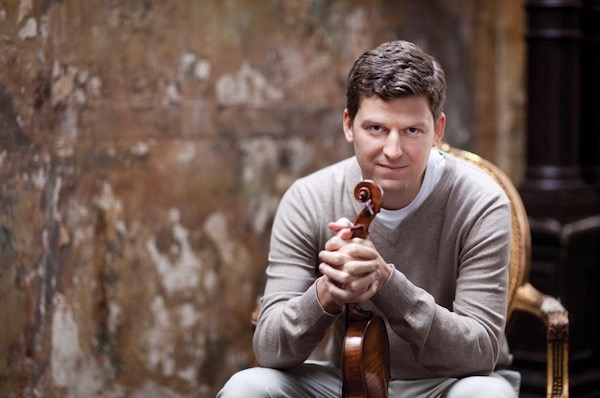Ehnes’s rapturous Sibelius highlights a mixed night from Gardner, London Philharmonic

James Ehnes performed Sibelius’s Violin Concerto with Edward Gardner and the London Philharmonic Monday night at David Geffen Hall. Photo: Benjamin Ealovega
The Great Performers series at Lincoln Center started the week off with a massive Romantic program on Monday night. Under the baton of Edward Gardner, the London Philharmonic gave a concert at David Geffen Hall that was ultimately rewarding, even if the main event proved disappointing.
Monday’s program began in the early Romantic period, with Beethoven’s stormy Egmont overture. Gardiner did his best work of the night in this brief starter, leading a thrilling, sonorous performance right from the opening chords, where he had the strings play without vibrato, letting the sound swell on its own. The orchestra showed a richness of tone, deep and powerful, but without the hard edges that are often exposed by the bright acoustic of David Geffen Hall.
Not so successful was Gardner’s take on Mahler’s Symphony No. 1, which made up the second half of Monday’s program. Throughout the performance, he had trouble balancing the orchestra, which is a major problem in a piece that has so many distinct parts moving at once. As a result, whenever he had to build a long phrase, the progression fell flat: the opening of the symphony, rather than materializing slowly out of eerie tension, sort of wheezed to life one section at a time.
Nor did he show much of a feel for the folk elements of the piece: the second-movement Ländler didn’t have nearly enough bounce to feel like a proper dance, and the brass—who hit rough patches of intonation throughout the symphony—clobbered their entrances. More detail in the strings helped to define the trio section, and the start of the slow movement was effectively layered, but the klezmer music lacked its crucial charm—apart from a few moments of flair, it felt simply melancholy.
The finale clarified somewhat out of its initial confusion, which could be an effective choice, yet the martial theme lacked sufficient punch to keep the music rolling forward. And though he found some lovely, sighing textures in the slow sections, Gardner let much of the conclusion dissolve into a jumble.
The most rewarding item of the night, then, was James Ehnes’s rapturous account of Sibelius’s Violin Concerto. Standing out among the major Romantic concerti for its emotional intensity, the heroic voice of Sibelius’s concerto feels like an animal let off its leash. Ehnes found that wild spirit in his reading, reining it in somewhat to communicate the first movement’s sense of deep longing, before letting loose in the ferocious cadenza.
Ehnes was a little forceful in his playing in the slow movement, which is hardly out of bounds, communicating a sincere, warm passion that grew out of control. Fire and pesante playfulness combined in the finale: the music here is thrilling, intense, fierce, but there’s a sense of mischief that runs under it all, and Ehnes struck the perfect balance. The orchestra was brilliant in the concerto, bringing electric energy to the accompaniment, though Gardiner showed a slight tendency to cover his soloist.
Staying on the wilder end of the late romantic, Ehnes offered the searing “Ballade,” Eugène Ysaÿe’s Third Sonata, as his first of two encores—an impressive show of musicianship, if a little tame for the music. His second, the sublime Largo from Bach’s Sonata No. 3 in C Major, was exquisite, a tender, simple rendition that allowed the warmth of Bach’s unassuming melody to shine through.
Posted Apr 22, 2019 at 11:09 am by Brian Hysong
Hi Eric, Suffice it to say (based on two performances of very standard repertoire) we were witness to what Ed Gardner brings to the table, and that the LPO is still one of the great ensembles that can bring great pleasure and satisfaction to very run of the mill programs.